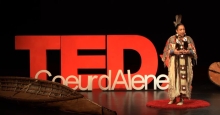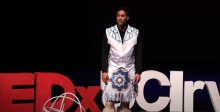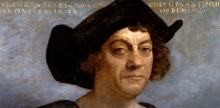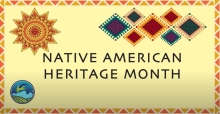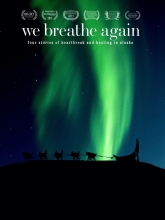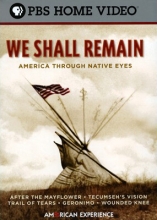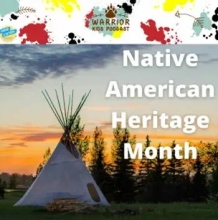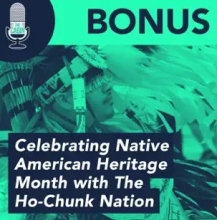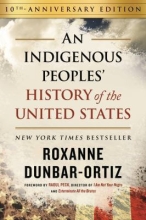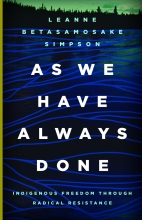
As a policy school dedicated to the public good and producing civically engaged and socially responsible leaders, the School is committed to creating an environment of diversity, inclusion and belonging for its faculty, staff, students and surrounding communities. To that end, here are recommendations to observe Native American and Indigenous Heritage Month.
Watch
Native Americans : We Shall Remain | LoVina Louie | TEDxCoeurdalene
LoVina Louie explains the historical root causes for the challenges facing many Native Americans. Her abundant insight and passionate stories lead into a heart-wrenching yet hopeful song that will captivate you as you listen to this talk. Louie is an enrolled member of the schitsu'umsh (Coeur d’Alene) tribe and a descendant of the nselxcin (Okanogan/Colville) and Nimipu (Nez Perce) tribes. She is a descendant of Chief Morris Antelope of the schitsu'umsh and Chief Manuel Louie of the Inkaneep Band in Oliver, BC, Canada. She serves as director of the Coeur d’Alene Tribe’s Marimn Health Wellness Center as well as the Coordinator for Qwest Life. Louie earned her bachelor's degree in organizational sciences from the University of Idaho with an emphasis in community and tribal wellness. Louie is the visionary behind the revolutionary exercise series “Powwow Sweat” and co-directed the American Indian Film Festival and Red Nation Film Festival award winning music video “We Shall Remain.” As a former Miss Indian World, she has traveled to hundreds of tribal communities. This talk was given at a TEDx event using the TED conference format but independently organized by a local community. Learn more.
The Modern Native American Story | Eric Hernandez | TEDxUCIrvine
Eric Hernandez is a renowned Native American hoop dancer who has dedicated his life to breaking stereotypes and embracing his cultural identity. Hernandez shares his personal journey of overcoming fear and the pressure to conform by showcasing his hoop dance, a traditional healing ceremony. Through mesmerizing demonstrations, he challenges misconceptions and invites the audience to celebrate diversity and embrace their own unique identities. Hernandez’s inspiring story, filled with resilience and determination, serves as a powerful reminder of the transformative power of sharing our true selves with the world. Don’t miss this extraordinary talk that will leave you inspired and enlightened. Hernandez is a Native American hoop dancer, storyteller affiliated with the Lumbee tribe. He has shared his story for millions around the world as the lead character in the Cirque du Soleil touring production, TOTEM. After 8 years of touring, Hernandez is now based in Los Angeles, where he continues to share, educate, inspire, heal and entertain people through the hoop dance. This talk was given at a TEDx event using the TED conference format but independently organized by a local community. Learn more.
Christopher Columbus - The Discovery Of America And What Happened After
In 1492, Christopher Columbus and his crew embarked on a journey that would forever change history. Traveling across the Atlantic to the Caribbean, they met the Taino people. This is the story of how the Spanish and the Taino people treated each other and what happened in the years that followed.
Native American Heritage Month
In honor of Native American Heritage Month, join in a celebration of Native American culture, traditions, and contributions to our society. Hear from special community guests who share their experiences and culture.
Exterminate All the Brutes - Directed by Raoul Peck
Based on works by three authors and scholars — Sven Lindqvist’s documentary “Exterminate All the Brutes”, Roxanne Dunbar-Ortiz’s “An Indigenous Peoples’ History of the United States”, and Michel-Rolph Trouillot’s “Silencing the Past” — “Exterminate All the Brutes” revisits and reframes the profound meaning of the Native American genocide and American slavery, and their fundamental implications for our present.
The series disrupts formal and artistic film conventions by weaving together rich documentary footage and archival material, as well as animation and interpretive scripted scenes that offer a counter-narrative to white Eurocentric history. Through a sweeping story in which history, contemporary life and fiction are wholly intertwined, the series challenges the audience to rethink the very notion of how history is being written
We Breathe Again - Marsh Chamberlain
For centuries, Alaska Native peoples survived the harsh conditions of life in the far north while their social, cultural, and spiritual practices thrived. In the 1700s, the battle to claim Alaska and its peoples began, first with Russia and then the United States, setting into motion disruptive changes for Alaska’s first peoples. The painful scars from colonization continue to cycle from one generation to the next. Faced with heartbreaking challenges, Alaska Native communities are striving to recover and regain balance. In a landscape as dramatic as its stories,the documentary “We Breathe Again” Intimately explores the lives of five Alaska Native people, each confronting the impacts of historic and contemporary trauma. Reflected in the northern lights and the city streetlights, from the ice roads to the asphalt, the characters battle for personal healing, hoping to break new trail for their families and their communities to follow.
We Shall Remain - Chris Eyre, Ric Burns and Stanley Nelson
This five-part American Experience documentary series shows how Native Americans have struggled for land from the 1600s to today. Around the time of the first Thanksgiving dinner, the Wampanoags agreed to help the starving and sickly pilgrims. Decades later, the colonists battled against the Native Americans in a brutal war, the first of many.
Listen
Native American Heritage Month
In Episode 5 of Season 2, Warrior Kids celebrate Native American Heritage Month. They talk about some of the terminology as well as highlight some amazing Native Americans from history and today. Tune in as they talk about everything Indigenous and share each other’s stories about what warrior kids are doing to protect our peoples and the planet.
Celebrating Native American Heritage Month with The Ho-Chunk Nation
Celebrate and honor National Native American Heritage Month with a member from the Ho-Chunk Nation to educate, share history and explain how the Ho-Chunk Nation is known as “the people of the sacred voice.” Watch the “Explore Ho-Chunk” playlist.
Read
An Indigenous Peoples’ History of the United States (10th Anniversary Edition) (ReVisioning History - Roxanne Dunbar-Ortiz (published October 3, 2023)
This American Book Award winning title about Native American struggle and resistance radically reframes more than 400 years of US history.
Unflinchingly honest about the brutality of this nation’s founding and its legacy of settler-colonialism and genocide, the impact of Roxanne Dunbar-Ortiz’s 2014 book is profound. This classic is revisited with new material that takes an incisive look at the post-Obama era from the war in Afghanistan to Charlottesville’s white supremacy-fueled rallies, and from the onset of the pandemic to the election of President Biden. Writing from the perspective of the peoples displaced by Europeans and their white descendants, she centers Indigenous voices over the course of four centuries, tracing their perseverance against policies intended to obliterate them
As We Have Always Done - Leanne Betasamosake Simpson
Leanne Betasamosake Simpson locates Indigenous political resurgence as a practice rooted in uniquely Indigenous theorizing, writing, organizing and thinking. She makes clear that the goal of Indigenous resistance can no longer be cultural resurgence as a mechanism for inclusion in a multicultural mosaic, calling for unapologetic, place-based Indigenous alternatives to the destructive logics of the settler colonial state. "This is an astonishing work of Indigenous intellectualism and activism—by far the most provocative, defiant, visionary, and generous of Leanne Betasamosake Simpson's impressive corpus to date.” -Daniel Heath Justice (Cherokee Nation), University of British Columbia.

